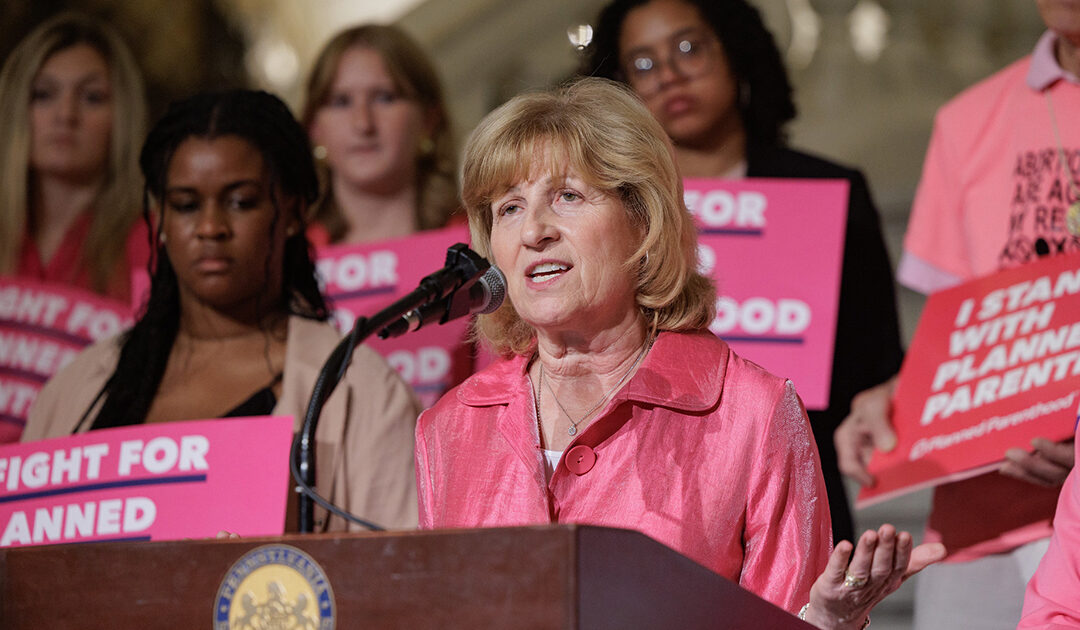On anniversary of Dobbs, legislators fight back with patient, provider protections
HARRISBURG, June 24, 2025 – Marking the third anniversary of the U.S. Supreme Court’s Dobbs decision, which has dismantled access to abortion health care in states across the country, Pennsylvania lawmakers today introduced two packages of bills to fight back and protect reproductive health care rights in the commonwealth.
Recognizing that the fight for reproductive freedom now rests with the states, the group of legislators said that codifying legal protections for patients and providers into state law is not just a policy choice – it’s now required to uphold the rights that millions lost when Dobbs was decided.
“We cannot solely rely on courts to decide women’s rights, and we will not tolerate attempts to criminalize women’s health care in our commonwealth,” said Women’s Health Caucus Co-Chair state Rep. Mary Jo Daley, D-Montgomery. “These protections are the culmination of three legislative sessions of work since Dobbs was handed down in 2022. We listened to women, expert stakeholders, human rights lawyers, doctors and nurses to clearly identify the protections that Dobbs has threatened, and then we created bills to re-establish and enshrine each of those protections at the state level.
“These laws draw a clear line: we protect our patients, our providers and their privacy – regardless of where they come from. Abortion care is legal in Pennsylvania, and it must always remain so.”
House Bills 1638 and 1640 through 1645 and S.B.s 881 through 887 are vital steps in protecting a woman’s freedom to make her own reproductive health care decisions. The bills would:
- Protect health care records related to reproductive services from disclosure in Pennsylvania civil and criminal actions or investigations.
- Instruct insurance companies to not take adverse action against health care providers who offer reproductive services to out-of-state residents.
- Prohibit Pennsylvania courts from cooperating with out-of-state civil and criminal cases involving reproductive health care services and prevent officials in other states from arresting individuals in Pennsylvania for abortion-related activities.
- Protect Pennsylvania’s abortion providers from having their home addresses disclosed to the public.
- Prohibit Pennsylvania courts from enforcing other states’ judgments in cases involving the provision of reproductive health care services.
- Instruct Pennsylvania’s health care licensure boards to not take adverse action against health care providers who offer reproductive services to out-of-state residents.
- Require pharmacies to use, upon request, the name of a physician’s health care practice instead of their personal name on prescription labels for mifepristone, misoprostol and their generic alternatives.
“This package of bills is about ensuring that people seeking reproductive health care in Pennsylvania can do so safely and that providers can continue offering care without unnecessary fear or interference,” said Women’s Health Caucus Co-Chair state Sen. Judy Schwank, D-Berks. “We want to make it clear that Pennsylvania remains committed to protecting access to legal abortion and supporting the professionals who deliver this essential care.”
The lawmakers are urging swift action on their bills. Last week in Texas, a federal judge vacated a key federal privacy protection for patients who have abortions or seek gender care, leaving their records exposed to law enforcement in states that prosecute patients – and those who help them – for seeking care in another state.
“It is critical we ensure that law enforcement from other states are not regulating what happens within our commonwealth’s borders,” said state Rep. Melissa Shusterman, D-Chester, a Women’s Health Caucus member and sponsor of the House bills. “As legislators, we must take action to protect our medical professionals. Without this assurance, we risk losing providers.”
Sixteen states currently ban abortions in some major form or altogether. The Associated Press reports that more than 25 million women ages 15‑44 – about 2 in 5 – now live in states with stricter abortion laws than existed before Dobbs. Women in these states are being denied urgent, and in some cases lifesaving, medical care. Across the country, women of color and low-income individuals still disproportionately face the greatest barriers to abortion care.
“Every single person deserves the freedom to make decisions over their bodily autonomy without fear, shame, or government interference. As attacks on reproductive health escalate across the nation, it is imperative that we act urgently to safeguard access to abortion care. We cannot afford to hesitate,” said Women’s Health Caucus Co-Chair state Sen. Amanda Cappelletti, D-Montgomery/Delaware. “Now is the time to defend fundamental rights and ensure everyone can make their own choices with dignity.”
###

